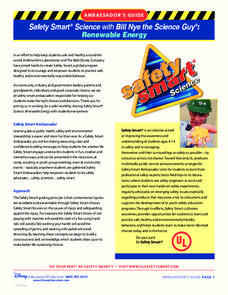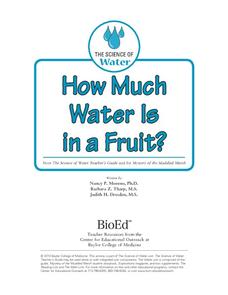Baylor College
Fossil Fuels and the Carbon Cycle
Humans are quickly depleting Earth's fossil fuels and locating them is becoming increasingly difficult! Layered muffins are used for models as young geologists take core samples in order to determine the presence of oil. Consider first...
Baylor College
Modeling Earth's Atmosphere
Life on Earth is made possible by the unique composition of its atmosphere. Working collaboratively, a scale model is created as young scientists learn about the different layers of gas that surround the planet. Cards are included that...
Baylor College
Greenhouse S'Mores
Your class will agree that this is the best way to demonstrate the greenhouse effect: making solar s'mores! Using a clear plastic cups as mini atmospheres, lab groups compare how adding different materials affects the melting rate of...
Baylor College
What Is the Water Cycle?
Small groups place sand and ice in a covered box, place the box in the sunlight, then observe as evaporation, condensation, and precipitation occur. These models serve as miniature water cycles and demonstrations of the three phases of...
Baylor College
What Makes Water Special?
Get close up and personal with a drop of water to discover how the polarity of its molecules affect its behavior. Elementary hydrologists split and combine water droplets, and also compare them to drops of oil. Much neater than placing a...
Baylor College
What Dissolves in Water?
One of water's claims to fame is as the universal solvent. Young physical scientists experiment to discover which materials dissolve in this special compound. You could never be more prepared for teaching this lesson plan than by using...
Baylor College
Can Nutrients in Water Cause Harm?
Ecology candidates culture pond water organisms over a few days time, then they experiment to find out how increasing nutrients affects the population. As part of a unit on water, this exploration gives your class an understanding of how...
Baylor College
What Is a One Part Per Million Solution?
Water may appear to be crystal clear, but there could be dissolved substances present. Lab groups make a one-part-per-million of a food coloring solution to demonstrate this concept. As part of an outstanding unit about water, this...
Baylor College
Dust Catchers
In class, your emerging environmentalists construct dust catchers. They take them home for a week or two, and then bring them back into class to examine under a magnifier. From this activity, they learn what makes up dust and that...
Baylor College
Moving Air
In lab groups, young scientists place aluminum cans with a bubble-solution cap into different temperatures of water to see what size of bubble dome forms. As part of an atmosphere unit in preparation for learning about convection...
Baylor College
How Can We Find Out What Is in Water?
Using paper chromatography, water watchers discover that several substances might be dissolved even though they aren't visible. For this case, you will prepare a mixture of three different food colorings for them to experiment with. A...
Nemours KidsHealth
Human Body Series - The Five Senses
Get your class up and moving with these engaging hands-on-activities that target their five senses. Children explore four different work stations that require them to look, smell, hear, touch, and taste as they record their responses...
ConnectED
Crime Scene Investigation
How exactly does a crime scene investigation work? The resource, a unit on criminology, covers everything from the deductive reasoning skills needed for detectives to DNA fingerprinting, all the way to how to gather evidence and bring...
Kenan Fellows
Making Connections with Water Quality
What's in your water? And, why is water quality so important? Enhance your class's level of water appreciation through a lesson that demonstrates the necessity of water quality. Environmental enthusiasts explore the EPA's Clean Water...
Kenan Fellows
The Little Stuff Can Make a Big Difference
Great things come in small packages! What better way to illustrate this point than a week-long look at nanotechnology? Earth science scholars explore water quality issues through lab activities, then research new innovations in nanotech...
Council for Economic Education
Federal Budget Lesson Plan and Fiscal Ship Student Game
The federal budget has never been so fun! Using an interactive game, high schoolers choose from a variety of policy options after identifying goals and try to balance these changes in policy with a federal budget.
Earth Day Network
Healthy Earth, Sick Earth
Earth is sick and needs our help! Read the children's book Planet Earth Gets Well to explain the various problems facing the planet, discussing what young conservationists can do to heal the planet along the way. A great Earth Day...
Disney
Renewable Energy
Bring some energy to your physical science curriculum with this engaging Bill Nye the Science Guy activity. Based on his Renewable Energy video, students explore the concepts of potential and kinetic energy and learn how they are applied...
Baylor College
How Much Water Is in a Fruit?
Compare the volume of an orange to the volume of liquid that can be extracted out of it. Also compare the mass of an apple before and after it has been dried out. In both of these activities, children find that there is an appreciable...
Baylor College
How Much Water Do Humans Need?
Physical or life science learners measure the amounts of water eliminated by intestines and the urinary system, and the amounts lost via respiration and perspiration. In doing so, they discover that the body's water must be replenished...
Baylor College
Plant Parts You Eat
Plants provide a variety of delicious foods essential for human survival. In the fourth lesson of this series on food science, young scientists investigate common fruits, vegetables, and grains in order to determine which plant part is...
Baylor College
Bio Build-up
Trace pollutants through the environment in the seventh lesson of this series on the science of food. Looking at a picture of the plants and animals in an aquatic ecosystem, learners use dot stickers to represent harmful chemicals as...
Baylor College
What's That Food?
Get things cooking with the first lesson in this series on the science of food. Working in small groups, young scientists make and record observations about different mystery foods. These descriptions are then shared with the class and...
Baylor College
Using Food Labels
Help your class make sense of nutrition labels with the ninth lesson of this series. After explaining the different information provided on packaged food labels, perform an activity that demonstrates the amount of sugar in a single can...
Other popular searches
- World Health Organization
- World Health Day
- Math and World Health
- World Health Debate
- Cdc World Health
- World Health Organisation
- World Health Day April7
- World Health About Glennie
- World Health About Glencoe
- World Health Science

























